25 Sep 2014
How Is Substance Abuse Childish Behavior?
It might seem like an odd way to think about substance abuse and addiction, but the behaviors are childish and immature. No one can claim ignorance of the negative consequences of drug or alcohol abuse, yet people do it anyway. Being impulsive and lacking self-discipline are traits that are common in children and which we are expected to outgrow. So why do drug abusers act like children and how can they learn to grow up?
Impulsivity, Self-Control And Drug Abuse
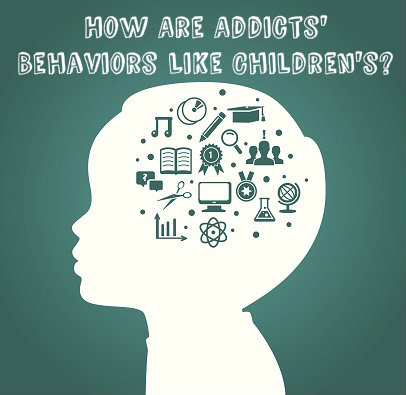 Controlling impulses is something we all have to learn as human beings. We are not born with self-discipline. As young children we reach for what we want. As we grow older we learn to control our impulses. Those who fail to learn the skill, for whatever reason, are not as successful. For instance, a study found that teenagers that exhibited strong self-control were more likely to be positive, achieve goals and be self-motivated and successful in academics than their impulsive peers.
Controlling impulses is something we all have to learn as human beings. We are not born with self-discipline. As young children we reach for what we want. As we grow older we learn to control our impulses. Those who fail to learn the skill, for whatever reason, are not as successful. For instance, a study found that teenagers that exhibited strong self-control were more likely to be positive, achieve goals and be self-motivated and successful in academics than their impulsive peers.
Research has also found that being impulsive and lacking self-control are traits that may be inherent in some people. We also know that having these traits makes some people more susceptible to drug abuse and addiction. If you can’t control your impulses, and if you lack the self-control to turn down a pleasurable drug because of negative consequences, you are more likely to be an addict.
Growing Up And Learning Self-Control
Just because addicts act more childishly and are more impulsive than non-addicted adults, does not mean they cannot learn to control themselves and be more emotionally mature. One powerful, yet simple, tool is distraction. People who have good self-control are good at distracting themselves. If something pleasurable is set before you, but you know you should resist, distract yourself. Think about other things or engage in an alternative activity—whatever you do, make the distraction positive. You will be more likely to control your impulse if you can distract yourself with something that is pleasurable and good for you.
Another good tool that emotionally mature adults use is stress-management. If you are stressed out, you put yourself in a negative cycle of bad behaviors and poor health. When stressed, you are more likely to be impulsive. Meditation, exercise, adequate sleep, good nutrition and mindfulness all help to manage stress and help you to make better choices, not ones based on impulses. The better you feel, the better able you will be to make good choices.
People with good self-control are good planners. Thinking about the future and planning for situations in which your self-control may be tested can help you to resist your impulses. For instance, if you are trying to cut back on drinking, consider all the possible situations you may face. If you’re going to a party, make a plan for how many drinks you will have and how you will resist the impulse to have more. Plan out how you will handle people who urge you to keep drinking. Making these plans can help lead you to successfully control your impulses.
Finally, maintain a positive attitude. Some people believe that willpower is a finite resource, but this isn’t true. You may be faced with a number of temptations, but you can learn through practice and experiences to control your impulses. You are not a child anymore, and although you still act like one at times, you do have the power within you to grow up and act like a mature adult with self-control.
05 Sep 2014
Discover When Partying Becomes Addiction
Partying can be a fun way to relax and unwind on the weekends and—when done without drugs and only moderate alcohol intake—a healthy way to combat stress. If, however, you are the type of partier who uses illicit drugs or who binge drinks, you could be heading down a dangerous road to addiction, serious health problems and even death. It may be time to question your partying habits and take a hard look at your actions. Are you partying responsibly and moderately? Or are you getting out of control?
When Does Partying Become Addiction?
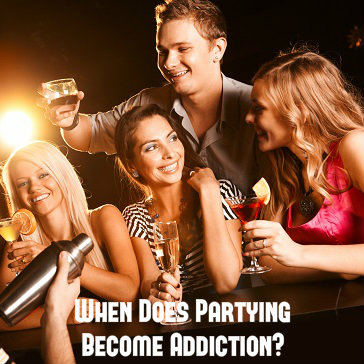 Partying may be as innocent as hanging out with friends at a house party with a couple of beers or going to a club for a few hours of dancing, but it can also mean using club drugs, drinking excessively, and making dangerous choices. You may even start partying and using what are considered to be non-addictive club drugs just once a week, but then find that you want to do it more and more. How do you know when you have crossed the line from a fun night out to going out of control and heading down the path to addiction?
Partying may be as innocent as hanging out with friends at a house party with a couple of beers or going to a club for a few hours of dancing, but it can also mean using club drugs, drinking excessively, and making dangerous choices. You may even start partying and using what are considered to be non-addictive club drugs just once a week, but then find that you want to do it more and more. How do you know when you have crossed the line from a fun night out to going out of control and heading down the path to addiction?
Here are some signs of addiction to watch for:
- You daydream about and crave the high you get when using a party drug or binge drinking. When you start to plan your party binges during the day and look forward to them more than once a week, you should be concerned.
- You develop a tolerance. In other words, you need more and more of a drug or alcohol to achieve the high and the euphoria that you crave.
- You start to use drugs or alcohol more often and in greater quantities. With tolerance comes the desire to use more. Be concerned if you start to increase the frequency of drug use or drinking in order to chase your high.
- You make poor decisions while under the influence. A serious aspect of problem drinking and drug abuse is engaging in risky behaviors that negatively impact your life. If you continue to use after getting sick from substance abuse, after missing work, or after getting into legal trouble, you have a problem.
Can You Turn Your Partying Around?
If you are beginning to question how much and how hard you party, you are in a good position to turn things around. Start cutting back right away. If it helps, do so in small steps. Eliminate one night of partying each week. On the nights that you do party, reduce your consumption of drugs or alcohol. Sometimes going cold turkey is not the most successful way to cut back.
Use your friends to help you stay focused on your mission to slow down. Tell everyone that you intend to cut back and ask for support. If any of your friends encourage you to party in spite of your declaration, they don’t have your best interests in mind and you need to let them go. For your nights off from partying, find sober friends to spend time with and engage in fun activities that don’t involve drinking or drugs.
If you try to cut back and find that you can’t do it, you may be further down the road than you thought and you may need professional help. Find an experienced substance abuse counselor or turn to a local support group for more resources. With professional help and the support of your friends and family, you can turn your life around before it is too late.
26 Aug 2014
How Changing Marijuana Laws May Impact Children
Changing attitudes toward marijuana in society have led directly to voters changing laws in municipalities and across entire states. Nearly half of all states allow the use of marijuana for medical purposes and two allow adults to use it recreationally, even while the federal government still outlaws the drug entirely. Many people see the benefits of allowing more use of the drug (e.g., helping people with certain medical issues and increasing state revenues). Others are more worried about the unforeseen consequences, such as how greater access to marijuana will affect children.
Kids Mimic Adult Attitudes Toward Marijuana
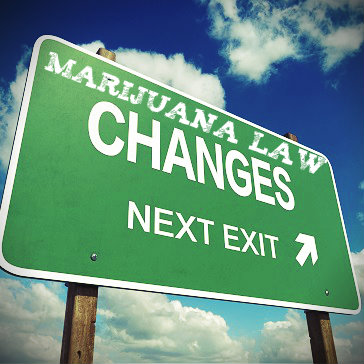 The changes in laws regarding the use of marijuana run parallel to the shift in the public’s general attitude toward this drug. Many supporters of marijuana legalization cite statistics and research that show how much safer the drug is than alcohol, a legal substance. Legalizing marijuana could make this less harmful substance as acceptable as alcohol. Many people see this as positive because it would provide tax revenue for state governments.
The changes in laws regarding the use of marijuana run parallel to the shift in the public’s general attitude toward this drug. Many supporters of marijuana legalization cite statistics and research that show how much safer the drug is than alcohol, a legal substance. Legalizing marijuana could make this less harmful substance as acceptable as alcohol. Many people see this as positive because it would provide tax revenue for state governments.
When you consider how children absorb the attitudes of the adults around them, you can understand how destructive legalized marijuana could be for young people. Most would agree that children and teens shouldn’t be allowed access to marijuana, but by sensing the lax attitude toward the drug that many adults have, young people will not take the risks of using marijuana seriously.
Alcohol, for instance, is legal for adults and considered to be socially acceptable among most people. As a result, teens use it too. Nearly half of all high school students drink, despite the negative consequences the behavior could produce. As adult attitudes toward marijuana shift to include social acceptance, you can expect teens to follow suit and begin to use the drug more often. As with alcohol, smoking marijuana is bad for teens. It affects the still-developing brain and can cause mental health issues as well as addiction.
Kids Poisoned By Marijuana
Laws giving adults greater access to marijuana mean children come into contact with the drug more than ever before. Because of this there has already been an increase in accidental ingestion by kids. Researchers found that there was a spike in visits to emergency rooms after states legalized medical marijuana and the federal government stated that it would not prosecute anyone with respect to its use for medical purposes.
One of the most common ways in which kids accidentally take in marijuana is through foods and drinks containing the drug. Such ingestions can cause children to have hallucinations, to have difficulty breathing, to lose consciousness, and even to die if the amounts are high enough or if the child isn’t treated immediately. What might be most worrisome about accidental poisonings of kids by marijuana is that it is a new phenomenon and doctors are not yet aware of all the possible harm it can cause.
Parental Neglect
Another way in which legalized marijuana, particularly for recreational use, may impact children is how parents getting high will treat their kids. Everyone knows how disruptive, and even abusive, an alcoholic parent can be to children, but what about a parent who gets hooked on using marijuana? Maybe the results would not be as devastating, but a parent who is high is not likely to do his or her job very well. Only time will tell if we see more neglect of children as marijuana use becomes legal.
Whenever laws change with respect to drugs or alcohol it is important to consider how the changes will affect young people. No matter how thoughtfully laws are crafted, or how careful adults and dispensaries are with the drug, children are bound to be impacted by increased access to marijuana.
Check Out More News On Drugs And Addiction
A recent study from the University of California, San Diego (UCSD) found that men infected with HIV who use methamphetamine may experience faster T-cell activation and proliferation. In other words, the use of methamphetamine may cause HIV to progress more rapidly to AIDS.
Who Was Studied?
 The study looked at 50 men who have sex with men (MSM). The average age of the participants was 46, and each had been on retroviral medication for HIV for an average of four years. Forty-two percent of the participants were white, 20 percent were black and 4 percent were Hispanic.
The study looked at 50 men who have sex with men (MSM). The average age of the participants was 46, and each had been on retroviral medication for HIV for an average of four years. Forty-two percent of the participants were white, 20 percent were black and 4 percent were Hispanic.
Once a month for a year, the study participants completed a survey about their adherence to antiretroviral treatment and their use of various party drugs. Twenty of the men reported using marijuana during the study period, 16 used meth, 12 reported drinking alcohol, 11 used cocaine and 13 of the respondents used some other party drug.
The researchers also used frozen samples of a type of blood cell with a round nucleus known as peripheral blood mononuclear cells (PBMCs) to evaluate reservoirs of HIV DNA, cellular HIV RNA, and the activation and proliferation of immune cells named CD4 and CD8 (sometimes known as T-helper cells or T cells). HIV binds itself to CD4 cells, which multiply in order to help combat infection. In this way, the immune system actually makes more copies of the virus it is trying to destroy.
What The UCSD Study Found
The UCSD study found that the men who used meth had higher levels of activated and proliferating CD8 and CD8 cells, poorer CD4/CD8 ratios, and greater reservoirs of HIV DNA that had been incorporated into the genetic material of a host cell—proviral HIV DNA.
The study also found higher cytomegalovirus (CMV) load and shedding in the semen of meth users. While HIV is a sexually transmitted disease (STD), and sexual activity remains the leading cause of HIV transmission around the world, levels of HIV in the semen of an infected man are actually lower than the levels of HIV in the blood. However, HIV levels in semen are higher in a subgroup of men, and the UCSD study found that HIV levels in semen were more likely to be high in the men who used meth. A higher level of HIV in semen makes it more likely that an infected man could transmit the disease through unprotected intercourse. Previous studies have found that HIV transmission among meth users occurs at a higher rate than among other HIV-positive individuals.
Although the participants in this study reported a variety of recreational drug use, meth was the only drug that appeared to have any significant influence on T-cell activation and proliferation, and on levels of proviral HIV DNA.
In order to eliminate variables that could also explain the difference in the progression of HIV, the researchers selected MSM of a similar age, with similar baseline CD4 and CD8 counts, who had spent a similar amount of time on antiretroviral medications, and who were not infected with any other STDs that could contribute to the worsening of their HIV.
Researchers do not yet understand why the use of methamphetamine could speed the progression from HIV to AIDS or increase cognitive impairment among men with HIV. One possibility is that meth use corresponds with difficulty sticking to a regimen of anti-viral medication (although the men in this study who used meth reported similar rates of adherence as non-meth users). Risky behaviors common to meth users may also have something to do with speeding health deterioration among men with HIV.
However, the fact that the other recreational substances used by men in the study did not affect their HIV makes it somewhat less likely that risky behaviors associated with drug use will successfully explain the way meth affects HIV. It may be that there is some physiological cause and effect through which meth use directly promotes AIDS progression and increased cognitive deterioration.
If you or someone you love is struggling with a drug or alcohol addiction – Call us now – Help is available 24/7…It’s worth it!
Depression can be a very serious mental health condition. People struggle with depression to varying degrees. For some it is a lifelong battle, while for others it comes on as the result of life situations but is temporary. In any type of depression, self-medication is common but ill advised. Self-medication is the use of drugs or alcohol to mitigate symptoms. It is a dangerous and destructive practice, but not everyone who does it realizes the harm they are causing. If you or someone you love struggles with depression, look out for and avoid self-medicating.
Depression And Substance Abuse
Self-medicating is particularly common for depression. It mostly occurs in people who have not been diagnosed and are not getting professional treatment for depression. If you feel depressed, it is natural to turn to something that will either make you feel better, or that will at least numb that bad feeling. Most people reach for alcohol, but prescription drugs and illegal drugs are used as well for the self-medication of depression. The rates of substance abuse among people with either depression or anxiety are as high as 20 percent.
The Dangers Of Self-Medicating
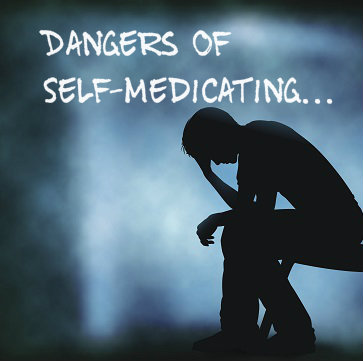 Self-medicating feelings of depression often work in the short term. It’s why so many people resort to it as a strategy for feeling better. Over a long period of time, however, doing so only causes more problems. Not least of these problems is the possibility of addiction. A dual diagnosis of depression and addiction is not uncommon. Relying on alcohol or drugs to make you feel better is a habit that leads to dependence. Your body will get used to the substance and you will find it difficult to quit.
Self-medicating feelings of depression often work in the short term. It’s why so many people resort to it as a strategy for feeling better. Over a long period of time, however, doing so only causes more problems. Not least of these problems is the possibility of addiction. A dual diagnosis of depression and addiction is not uncommon. Relying on alcohol or drugs to make you feel better is a habit that leads to dependence. Your body will get used to the substance and you will find it difficult to quit.
Another problem with self-medicating is that it never allows you to confront and deal with your depression. Drinking or using drugs is like a quick fix, but one that doesn’t last. It is not a permanent solution to your problems. Only treatment by health care professionals using therapy in combination with appropriate medication will provide you with lasting relief. In fact, research into teenage depression has found that self-medication can actually make a mental illness more serious.
How Can I Tell If Someone Is Self-Medicating?
If you’re worried that someone you care about may be struggling with depression and is self-medicating, act immediately. Be there for your loved one and offer your help. People often don’t realize that they are depressed. It is usually easier for others to see the signs.
First look for signs of depression:
- Feelings of hopelessness or loneliness
- Apathy
- Changes in sleeping habits
- Weight loss or gain
- Irritability or irrational anger
- Difficulty concentrating
- Reckless behaviors
- Unexplained aches and pains
If, in addition to seeing these signs in someone, you also see them using drugs or alcohol frequently or to excess, he or she is probably self-medicating for depression. Your loved one may try to hide drug use or drinking, which is another clear sign. Confront this person as soon as you can, but do so in a loving and compassionate manner and offer your help.
Depression is a complex mental illness. It afflicts many people, who often turn to substances for relief. Instead of drugging the problem, get help for yourself or your loved one. The care and treatment given by professionals is the right solution to coping with and living with depression. Self-medicating may feel right initially, but the good feeling won’t last. It will only make the condition and symptoms worse.
Learn More About Dual Diagnosis
If You Or Someone You Love Is Struggling With Mental Illness and/or Addiction – Call Us Now To Speak To A Recovery Advisor! We Are Here To Help!
Adolescence – that interesting, exciting, and challenging period of life that ever one of us has to go through. Of course, some seem to stay perpetually stuck there emotionally, long after they’ve left their teen years behind. But for most, it’s a several-years-long transition from childhood to adulthood. The journey is often bumpy, even for the teens that seem to have things reasonably together.
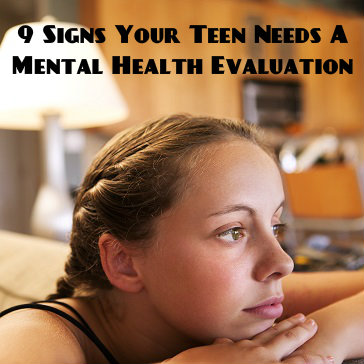 Unfortunately, though, some teens really struggle during this phase of life – beyond what would (or should) be considered normal adolescent ups and downs. It can be hard, as a parent, to know when to take the attitude of “this, too, shall pass” versus “it’s time to seek professional help for our son / daughter”. Sometimes there’s a significant gray area, and multiple factors need to be considered. But more often than not, the signs are pretty clear – if you’re paying attention; that can be a challenge for parents with harried schedules and plates overflowing with obligations and responsibilities.
Unfortunately, though, some teens really struggle during this phase of life – beyond what would (or should) be considered normal adolescent ups and downs. It can be hard, as a parent, to know when to take the attitude of “this, too, shall pass” versus “it’s time to seek professional help for our son / daughter”. Sometimes there’s a significant gray area, and multiple factors need to be considered. But more often than not, the signs are pretty clear – if you’re paying attention; that can be a challenge for parents with harried schedules and plates overflowing with obligations and responsibilities.
Since this phase of your child’s life will have a significant impact on his or her future, the sooner mental health issues are addressed, the better. Following is a list of indicators that your teen likely needs mental health treatment – or at the very least needs an evaluation by a psychologist or other mental health professional. If after reading through them, you’re still hesitant or unsure, at least take your teen in for an evaluation to determine whether or not treatment is necessary.
Remember, many parents tend to view their teens through at least somewhat rose-colored glasses, minimizing or turning a blind eye to serious issues. Sadly, doing so can have very serious repercussions down the road. Better to err on the side of caution than to ignore problems or assume things will work themselves out. If treatment is warranted, it’s absolutely in your teen’s best interest to take that step now rather than later (or even worse, never).
9 Warning Signs Your Teen Needs A Mental Health Evaluation
1 – Your teen is having problems functioning on a day to day basis. One of the primary criterion for practically every disorder listed in the DSM (the diagnostic manual used by mental health professionals) is that the symptoms are severe enough to interfere with day to day functioning or significantly impact at least one or more major area of life (e.g. relationships, school, or work). For example, it’s normal to occasionally feel sad or blue, but it’s not normal to self-mutilate when sad or angry, or become completely withdrawn for weeks at a time.
Signs that your teen isn’t functioning normally may include:
- A notable drop in grades
- Frequent absences or tardiness at school or work
- Decrease in personal hygiene
- Difficulties concentrating
- Bizarre behavior
- Low energy
- Difficulties making decisions
- Inability to cope with minor frustrations
Some psychiatric problems develop quickly, while others develop slowly over time. It’s always important to note any negative changes from your teen’s prior behavior. While it may be temporary, it can also be a sign of something serious.
2 – Your teen appears depressed, sad, withdrawn, or “blue” much of the time, or is often tearful or irritable. Each of these is a potential indicator of depression. As mentioned above, feeling sad or blue from time to time is perfectly normal – it’s part of being human. But it’s important to realize that, even with teens, an often depressed mood is not normal and needs to be addressed.
Many children and teens struggle with undiagnosed depression, suffering in silence for months or even years. Parents and other adults may mistakenly attribute an introverted, quiet demeanor to their personality rather than realizing depression is the real culprit. With proper treatment, a formerly depressed, withdrawn teen can become surprisingly outgoing.
It’s important to note that a significant loss (e.g. the death or loss of a friend, close relative, or beloved pet, or even a major move) can trigger profound feelings of sadness in your teen. However, while grieving is normal, healthy, and necessary, some teens don’t cope well with loss and get stuck in their grief. A major loss can trigger depression as well as exacerbate an existing depression.
While an episode of depression can be short-lived (e.g. a few weeks), it can also last for years – especially if left untreated. It can also lead to other serious problems for teens, increasing their risk for suicide, substance abuse and addiction, and serious academic problems. A drop in grades can make it difficult for them to get into college, and an ongoing or recurring battle with depression can negatively impact their performance if they do get in.
3 – Your teen has intense or rapid mood swings. Adolescent angst – it’s normal, right? Well, yes – to some degree. After all, teens are notorious for being moody, which is often attributed to hormonal changes and fluctuations. However, while occasional or mild moodiness may be normal, frequent intense or rapid shifts in moods shouldn’t be ignored.
Even in teens, a generally upbeat (or at least neutral) mood is a good indicator of healthy psychological functioning and emotional stability. Significant deviations from that may be a sign of psychiatric problems, including depression, bipolar disorder, or borderline personality disorder.
Keep in mind, if your teen is using alcohol or drugs, those substances can also cause erratic or intense mood fluctuations. Significant stress (e.g. parental separation or divorce, or a recent breakup with a boyfriend or girlfriend) can also make your teen moodier than usual. If the mood swings are persistent, an evaluation is warranted. Even if stress is the primary cause (as opposed to a diagnosable disorder), a skilled therapist can help your teen learn healthy coping skills that will be beneficial for years to come. If substance abuse is the cause, early intervention is essential.
4 – Your teen is frequently using alcohol or drugs (which can include prescription drugs, OTC medications, and inhalants) to cope with stress or negative emotions, or fix a problem. It goes without saying that substance use in teens should never be taken lightly. Teens may think it’s expected and acceptable to drink with their friends and experiment with drugs, but the consequences can be devastating. Not only are many substances potentially addictive (leading to more serious long-term problems), they will also impair your teen’s judgment.
With regards to the need for mental health treatment, many teens start drinking or using regularly as a way to “self-medicate” psychiatric symptoms, such as anxiety or depression. They may also turn to illicit substances to enhance athletic performance, quickly drop unwanted pounds, or stay alert while studying for exams. A few beers can quiet racing thoughts, while a friend’s ADHD medication can temporarily boost a negative mood. Your teen may think they’re harmless enough (especially if they are “acceptable” substances, like alcohol or prescription drugs), but it’s an especially serious matter when they’re used to escape, cope, or fix a problem. This is because every time they provide even a little relief or benefit, the desire to use them again is significantly reinforced.
If your teen has a substance abuse problem and a mental health condition, he or she would be a good candidate for what’s known as “dual diagnosis” treatment. Treating only the substance abuse issue or only the mental health disorder will set your teen up for failure. Treating both disorders simultaneously is the best way to ensure a positive outcome and prevent a relapse down the road.
5 – Your teen is preoccupied with his or her weight or physical appearance, and / or has notable issues with eating and food in general. Body image issues and eating disorders often emerge during adolescence. Teens experience significant growth spurts and hormonal changes – both of which can cause problems such as acne and unwanted weight gain (as well as being too thin). They’re also becoming keenly aware of their sexuality. This can be particularly scary for teens with a history of sexual abuse (who may try to thwart the development of curves by starving themselves or binge eat in order to gain enough weight to be undesirable). Other teens feel a desperate need to make themselves more attractive typically involves being thin.
Combine society’s pressure to be thin and beautiful (or muscular and athletic), poor coping skills, and a fragile self-esteem, and you’ve got the perfect recipe for an eating disorder (such as anorexia or bulimia) or another, lesser-known disorder known as “body dysmorphic disorder” (BDD). Eating disorders and BDD not only often go hand in hand; they can also trigger or worsen other disorders, such as depression, anxiety, and substance abuse disorders.
Eating disorders can be especially serious because they often cause significant medical health issues and, for some, permanent physical damage. Anorexia, which is one of the most well-known eating disorders, is also one of the most deadly mental health conditions.
It’s important to note that serious body image issues and a severely dysfunctional relationship with food don’t just affect females. Adolescent males are also vulnerable to developing eating disorders as well as BDD.
6 – Your teen is often anxious or fearful, struggles with obsessions or compulsions, or worries excessively. Anxiety disorders are quite common in children and adolescents. Problems with anxiety can develop gradually or appear suddenly. An abrupt onset is often triggered by a traumatic incident, such as a natural disaster, a school shooting, or being the victim of a violent or sexual assault.
Problems with anxiety often include irrational fears, such as obsessing about having a serious illness or being contaminated by germs, or being terrified by something like spiders or dogs (even if it’s only a photo of a dog or the spider is securely encased in a glass terrarium). Nightmares, nervous habits (e.g. fidgeting, nail biting) and difficulties sleeping are not uncommon in anxious teens.
Occasional fear and worry are normal. However, when anxiety becomes constant, excessive, and / or irrational, it can be paralyzing and interfere with every aspect of your teen’s life.
7 – Your teen is hostile, violent, aggressive, and / or has difficulty managing anger. A teen who’s often angry, irritable, destructive (to self or others), violent, or hostile is a teen who needs help. When any of these behaviors or emotionsoccurs – especially frequently or regularly – it’s a red flag that needs to be taken very seriously.
Angry kids often become angry – and destructive – adults. They’re more vulnerable to accidents, substance disorders, suicide attempts, depression, and abuse or violence towards others. They’re also going to have serious problems at school, at work, and in their relationships.
These particular behaviors and emotions may be due to a variety of factors, including substance use (e.g. steroids, alcohol, or stimulants), trauma, mood disorders, psychosis (e.g. grandiose or paranoid delusions), and personality disorders. Even if your teen doesn’t meet the criteria for a specific disorder, therapy can help him or her learn to manage intense emotions and aggressive impulses.
8 – Your teen has experienced a recent trauma. Although not every teen needs therapy after being subjected to a traumatic event, it’s always wise to have him or her evaluated. Traumatic events are difficult enough for adults with good coping skills and a strong support system. Teens, however, often have yet to fully, or at least sufficiently, develop the skills required to sustain them when their world is turned completely upside down by trauma.
If your teen is having flashbacks, frequent nightmares, experiencing depression or anxiety, having trouble sleeping, or avoiding people, situations, or places that remind him or her of the trauma, treatment is likely necessary.
9 – Your teen is preoccupied with, is threatening, or has attempted suicide. Adolescence is one of the highest risk age groups when it comes to suicide. One of the reasons for this is that teens tend to be very impulsive. They also have a difficult time seeing the bigger picture and realizing that they can and will get through something that – at least in the moment – feels absolutely unbearable, such as the devastating, unexpected end of a romantic relationship.
Suicidal talk, threats, and attempts should always be taken very seriously. Countless parents who have lost a son or daughter to suicide would be quick to say they’d give anything to go back in time and heed the signs – signs that, in retrospect (at least in their minds), should have been so obvious.
Any preoccupation with suicide and death can be a potential clue that your teen is toying with the idea of ending his or her life. Threats are an even stronger indicator. Although some threats are idle, don’t make the mistake of assuming that your teen is just being dramatic. An angry or upset impulsive teen may make a serious attempt, resulting in permanent physical damage or death – even though he or she had no real intention of dying and just wanted to get your attention.
A suicide attempt – even if non-life-threatening – should always be taken very seriously. A naïve teen may think 4 or 5 Tylenol pills or a superficial cut to the wrist are enough to cause death. Don’t underestimate the seriousness of their actions. Additionally, one of the greatest predictors of future suicide attempts is a history of prior attempts.
Keep in mind that suicide isn’t always due to depression. Even when it is, the signs of depression may be subtle. Some teens may get involved in a suicide pact with friends for various reasons. Others may have been depressed, but once they made the decision to end their life they started feeling better. Ironically, a decision to commit suicide can be empowering and actually boost one’s mood, leaving others more baffled than ever when the person – who no longer seemed depressed – ends his or her life.
Any and all suicidal talk, threats, and behaviors warrant an evaluation by a mental health professional as soon as possible.
As a parent, you have a huge responsibility. Teens often lack the insight and maturity to realize when they need help. They also may mistakenly believe that what they’re experiencing is normal or that no one could possibly understand or help them. And, of course, some teens don’t want anyone prying into their personal life. That’s why it’s important to pay attention, keep the doors of communication open, and be ready to take action when needed.
Yes, your child may be mad at you for a while if you make him or her “see some stupid shrink”. But wouldn’t it be far better to endure a brief period of adolescent petulance than watch your precious child suffer for months or years with an undiagnosed, untreated mental health issue – especially one that could have been overcome or significantly alleviated and managed with proper (and early) treatment?
If You Think Your Teen Is Suffering Emotionally Or With A Mental Health Issue, Call Us Now, We Are Here To Help!
Peer pressure is a powerful force. You probably remember experiencing it yourself. It can take tremendous strength of will to say no in the face of your peers urging you to do something. If you have a teenage son or daughter, remembering what peer pressure was like might keep you up at night. The good news is that you have the potential to be the most powerful influence in the lives of your children. If you take the time to help your teen understand the dangers of risky behaviors, keep open communication and get to know your teen, you can help her successfully resist peer pressure.
What Is the Role of Peer Pressure in Adolescence?
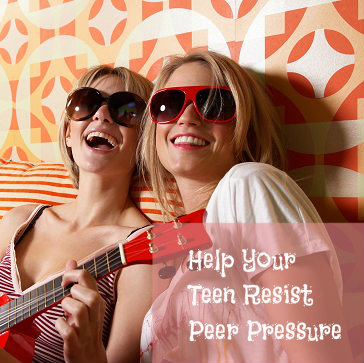 It turns out that peer pressure is normal and that it’s not always a negative thing. Teens are learning how to become adults by learning how to fit in with peers. While always conforming to the standards of others is not good, neither is standing out all the time. To grow into adults that contribute in meaningful ways, teens need to learn to strike a balance. They need to fit into social groups while also learning to make their own decisions.
It turns out that peer pressure is normal and that it’s not always a negative thing. Teens are learning how to become adults by learning how to fit in with peers. While always conforming to the standards of others is not good, neither is standing out all the time. To grow into adults that contribute in meaningful ways, teens need to learn to strike a balance. They need to fit into social groups while also learning to make their own decisions.
We tend to think of peer pressure among teens as always leading to dangerous behaviors, such as having sex, trying drugs, drinking or shoplifting. These are the sorts of incidences in which peer pressure is negative. On the other hand, your teen may be pressured by friends to go out when she is feeling down after a breakup, or they may pressure her to join extracurricular activities with them. These are positive pressures. If you can help your teen to understand the difference between positive and negative peer pressure, she will start to make better choices.
How Can You Help Your Teen Recognize And Resist Negative Pressure?
Your teen’s ability to recognize what is right and what is wrong begins with you. By sharing and demonstrating your own values, you pass them down her. If you talk to your teen about what you expect of her and what you value, your influence will be more important than that of her peers. It can be easy to lose sight of this fact during the teen years. The time your child spends with her friends can make you begin to feel as if your opinions no longer matter, but it isn’t true.
Sharing your values with your child will help her to recognize the difference between positive and negative peer pressure, but she also needs to be able to resist the latter. One of the most important things to do is to cultivate open lines of communication. When your teen knows that she can talk to you, she will bring her issues to you for discussion. If you don’t know that she is experiencing peer pressure, you can’t help her.
When you do talk to your teen about what is troubling her, give her suggestions for how to say no. Encourage her to stick with friends who have the same values. There is strength in numbers. Cultivate her self-esteem so that she feels confident being assertive in pressure-filled situations. Self-esteem comes from being able to accomplish goals and by being good at things, so encourage her to get involved in activities she enjoys and is good at. This could be sports teams, academic clubs, theater groups or any other healthy activity.
Peer pressure may be a powerful force, but good parenting is even stronger. Develop a good relationship with your teen that involves open communication and you will help her resist making bad choices based on pressure from her peers.
Learn More About How To Combat Peer Pressure
04 Feb 2014
How Is Your Drinking Impacting Your Kids?
You don’t have to be an alcoholic for your drinking to have a negative impact on your children. When you drink too much, there are numerous ways in which your children are affected. You are shaping their attitudes toward alcohol and drinking, but you also may become a different person when you drink. Your shifting moods, your time devoted to drinking, your use of alcohol to temper your emotions; all of these impact your children.
Does My Drinking Determine If My Child Will Drink?
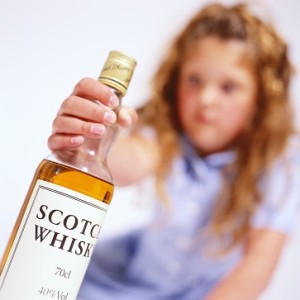 Everything you do and say helps to shape your child’s outlook on life and how he relates to the world. What you do—your actions—are far more impactful than what you say. If you lecture your children on the importance of drinking in moderation and then regularly go off the deep end with your own drinking, the latter is what they really notice.
Everything you do and say helps to shape your child’s outlook on life and how he relates to the world. What you do—your actions—are far more impactful than what you say. If you lecture your children on the importance of drinking in moderation and then regularly go off the deep end with your own drinking, the latter is what they really notice.
According to research, the best way to positively impact your children’s future drinking habits is to limit their exposure to alcohol. When you demonstrate that drinking excessively is fun and normal, your children will most likely adopt the same attitude.
Does My Drinking Affect My Children Emotionally?
Your drinking can have a strong impact on the emotional states of your children. A wide range of feelings are stirred up in your children when you have had too much to drink: embarrassment, sadness, anger and perhaps worst of all, helplessness. When you drink too much, you get out of control, whether you are a happy or a hostile drunk. Your children will notice this and feel helpless to do anything about your inevitable mood shift.
Your drinking may also cause your children to feel stressed and worried. They might be concerned that you will drive drunk, that you’ll get hurt or even that you will hurt them when your mood turns sour. They may worry and become stressed when they see you begin to drink, wondering if you will have too much this time and hoping that you will remain in control and limit yourself better. The way your drinking makes your children feel can leak into all aspects of their lives. They may end up feeling depressed or anxious at school, embarrassed to have their friends over to the house or always afraid of you when you have a drink in your hand.
How Can I Limit The Harm My Drinking Causes?
Out of control and excessive drinking are what impact children so negatively. You need not be an alcoholic to have these effects on your children, but you also do not need to abstain entirely from drinking to ensure they are safe and happy. To limit the harm your drinking causes, limit your drinking. Demonstrate to your children a healthy relationship with alcohol. Don’t drink so much that you lose control or to get tipsy. Limit the number of nights that you have a drink. When you drink reasonably, you model a good attitude toward alcohol.
Another important aspect of normal drinking is to avoid turning to alcohol to cope with stress or other emotions. Emotional drinking is a slippery slope that can lead to problem drinking. Instead, model for your children healthy ways to cope with stress. Use exercise, relaxation techniques, and hobbies to cope with negative emotions.
If you do mess up and drink too much in front of your kids, or end up with a hangover, sit your kids down to talk about it. Open discussions about alcohol will help your kids. They will feel like they can talk to you and open up about what concerns them. Your actions will always have an impact on your children; whether that impact is positive or negative is up to you.
Find Out If Alcohol Is Ruining Your Life With These Simple Questions


